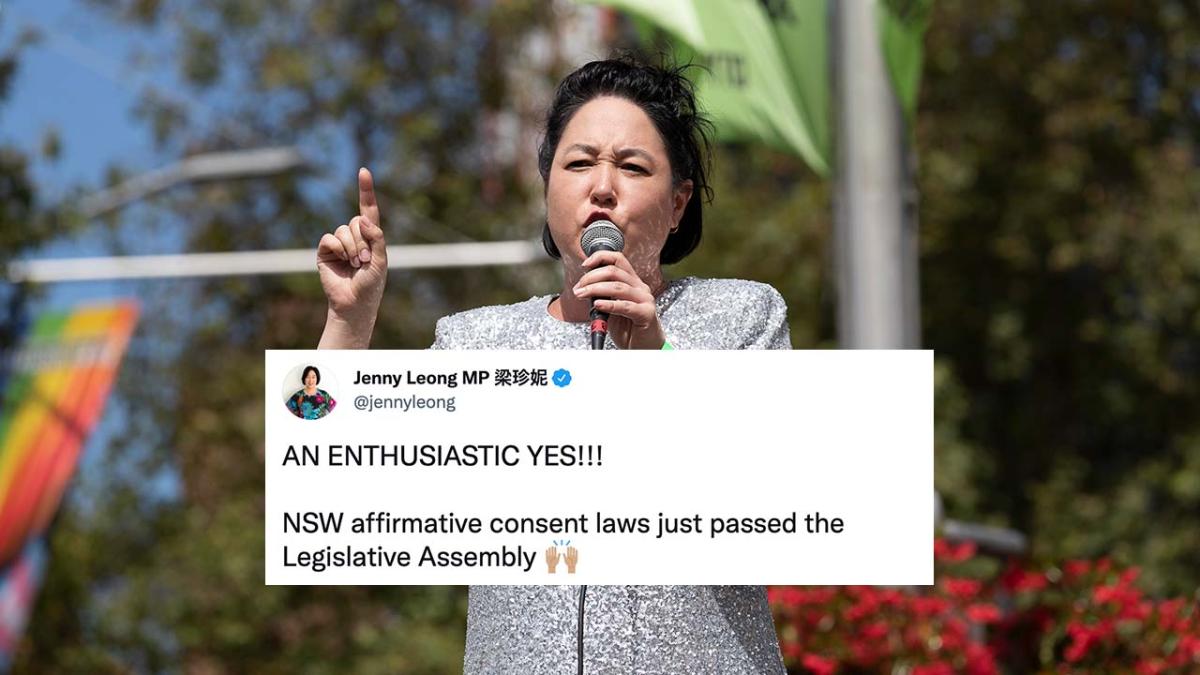
The NSW Parliament is one step closer to mandating affirmative sexual consent, during any sexual activity.
Under the bill, proposed by NSW Attorney-General and Minister for Prevention and Sexual Violence Mark Speakman in May, a person only gives consent if “at the time of the sexual activity, they freely and voluntarily agree to the sexual activity”, and if it is communicated clearly.
If consent is not clearly communicated, the other party must ascertain it before progressing further including during different acts of sexual activity. Last night, according to Greens MP Jenny Leong, the State Parliament voted “an enthusiastic yes”. She presented the bill to parliament.
AN ENTHUSIASTIC YES!!!
NSW affirmative consent laws just passed the Legislative Assembly 🙌🏽
— Jenny Leong MP 梁珍妮 (@jennyleong) November 10, 2021
The wonderful @jennyleong speaks for me today. In using her voice she brings all survivors into parliament with her. I support Jenny 100% in these amendments
— Saxon Mullins (@SaxonAdair) November 10, 2021
@jennyleong is now moving a very important amendment to the sexual consent reform bill in the NSW LA.
Affirmative consent requires words or actions IMMEDIATELY before a sexual activity.
“A reasonable time” before is way to vague & creates an opportunity to escape the obligation pic.twitter.com/ng8PvjzTdI
— Hayley Foster (@HayleyFoster_) November 10, 2021
In a speech in NSW Parliament on the 20th of October, Speakman said: “No one should assume that someone is saying yes just because they don’t say no or don’t resist physically”.
“People are entitled to expect that if someone wants to have sex with them then the other person will ask. If the first person hasn’t said something, or done something, to communicate consent, then that other person will take further steps to ascertain consent.
“This is just a basic matter of respect.”
⚖️Today I intro’d a bill into @NSWParlLA to bring common decency to our sexual assault laws.
⚖️Consent to sexual activity should not be presumed; it should be communicated.
🙏Thanks to @SaxonAdair for advocating #affirmativeconsent + @NSWLawReform for its important work. 1/2 pic.twitter.com/GemEasZ7fy— Mark Speakman (@MarkSpeakman) October 20, 2021
The bill was recommended in the NSW Law Reform Commission (LRC) Report 148 and was inspired by victims of rape and sexual violence advocating for better support, like survivor advocate and director from Rape and Sexual Assault Research and Advocacy Saxon Mullins. According to Speakman, Mullins has had to talk about her experience as a victim of sexual assault in four court cases.
“These reforms mean so much to so many survivors who understand firsthand the difference this bill can make,” Mullins said in a press release shared on October 20th.
“It has been three years since I came forward to share my own story, and while progress can feel slow, I know this bill is a huge leap forward and will see NSW leading the way in consent law around the world.”
“Victims of sexual assault who courageously come forward need to know that they are fully supported – both at the investigative stage but also through the judicial process,” NSW Police Commissioner Mick Fuller added.
According to an NSW government press release, the bill will introduce a legal clarification of consent needing to be clearly communicated, as well as “five new jury directions for judges to address common misconceptions about sexual assault and behaviourial responses”, education programs for judges, lawyers and police, a research project looking into the experiences of victims and survivors with the criminal justice process, and a community awareness campaign.
While aimed at decreasing sexual violence and encouraging people to consciously think about consent, it also will help victims in sexual assault and rape cases when their alleged offender claims they had “reasonable grounds” to believe that they were given consent.
In that same way, the bill will give legal protection to victims of sexual violence who say that they were frozen during sexual activity and unable to clearly communicate that they no longer consented to something mid-act.







